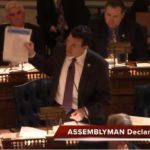O’Scanlon releases Arbitration Task Force report recommending permanent award cap
TRENTON, N.J. – Assemblyman Declan O’Scanlon released today the report of the Arbitration Award Task Force as recommended by four of the eight members. The report outlines the success of the arbitration award cap in enabling municipal officials to maintain budgets within the 2 percent property-tax cap and curb property-tax increases to historically low levels, and recommends making the cap on arbitration awards permanent before the policy is scheduled to sunset on Dec. 31.
“The data contained in this report is beyond clear and convincing; it is overwhelming,” said O’Scanlon (R-Monmouth). “It would be irresponsible for the Legislature not to take action. In fact, any legislator that fails to advocate for continuation of the arbitration award cap will be, by extension, advocating for the obliteration of the property tax cap and higher property taxes. There is no middle ground here. Mark my words; if the cap isn’t permanently extended taxpayers will unquestionably face much more dramatic property tax increases and cuts to municipal services.”
During a vote Monday to release the report, the task force was deadlocked 4-4. Union representatives blocked the report’s endorsement. O’Scanlon, who voted to release the report, is the only legislator appointed by the governor to sit on the task force.
“I find it unfortunate that while this report, and the voluminous supporting data, is completely consistent with, and draws the same conclusion as, every previous task force report some members are still inclined to keep this information from the public,” O’Scanlon added. “This is particularly distressing given that so many key legislators have specifically said their action is dependent on its release. When it comes to controlling our state’s highest-in-the-nation property taxes these transparent games are totally unacceptable.”
“The data contained in this report is beyond clear and convincing; it is overwhelming. … Mark my words; if the cap isn’t permanently extended taxpayers will unquestionably face much more dramatic property tax increases and cuts to municipal services.” – Assemblyman Declan O’Scanlon
During a June Assembly voting session, O’Scanlon made a motion to remove the sunset provision from the law, but Democrats tabled the action along party lines 52-25. Democrat legislative leaders have said they would wait for the recommendations in the Task Force report before taking action.
“My fellow legislative leaders have said they needed to see this data prior to taking action. Here it is, and it’s definitive,” O’Scanlon continued. “Union representatives argued for stalling the release of the data and report. The only question remaining is which Democrat legislative leaders will stand with vested special interests and which will stand with beleaguered property taxpayers. To be clear, this isn’t a cap on police salaries. Municipal officials can agree on any level of salary increase they wish.During a June Assembly voting session, O’Scanlon made a motion to remove the sunset provision from the law, but Democrats tabled the action along party lines 52-25. Democrat legislative leaders have said they would wait for the recommendations in the Task Force report before taking action.
“The conclusions the data supports are undeniable. The arbitration award cap and property tax cap are unseverable and essential policies if we are serious about keeping property tax increases at the historically low rates of the last few years. The data and the report confirm what the laws of mathematics dictated from the start, you can’t have an effective cap on property taxes without an identical cap on arbitration awards. We can’t tell local officials their revenues can only increase by two percent, but that the largest line item in their budgets must increase by three percent or eight percent or any amount higher than the tax cap. And it isn’t just police and firefighter salary costs that are effected, there is a ripple effect throughout all salary expenses.”
O’Scanlon also made the case that legislative action is urgent before the arbitration cap sunsets at the end of this year. “It would be completely irresponsible, and a disservice to property taxpayers, to fail to remove the sunset of this essential policy before the sunset at the end of this year. The last time the cap expired the Democrats dithering cost taxpayers hundreds of thousands of wasted dollars in professional fees alone as towns scrambled to file unnecessary arbitration actions to insulate themselves from the majority’s paralysis.”
2017 Report of the Governor’s Appointees to the Police and Fire Public Interest Arbitration Impact Task Force
Task Force Report Tabs










The loss of the cap will almost certainly lead to larger budget increases, but not “cuts to municipal services.” On the contrary, the unrestrained ability to raise taxes is likely to lead to fewer service cuts.
NJ IS BROKEN
The caps seem to have worked based on the report but seem a bit complicated for the average person. When I had some involvement in steps and realized we were raising pay levels on steps that had no people in those levels it became a no brainer to increase the step numbers. When you realize teachers or law enforcement are getting steps and raises on top of the steps, it is easy to see how government consistently grows at above 8% per year. Then laws come in which shorten work weeks, extend time off or allow earlier retirements the agency needs to hire more people and there are increased levels of people receiving pensions. Then all the early retirees are not happy unless they have a government job which of course displaces are young people and/or they have one created for them. NJ IS BROKEN!
Meanwhile benefits become an increasing percentage of the overall pay package with benefits reaching up to 80 cents on a a dollar of wages. So a $1,000 of pay has to be matched with $800 in benefits.
In my opinion, with 550,000 public employees serving 9 million residents a statewide reorganization is needed. Some of these things are happening now but not to the scale required to move the needle.
1. Headcount reduction – too many redundancies between state, county and local governments.
2. Consolidation and/or elimination of 565 towns and now 598 school boards.
3. Need to merge small towns into bigger towns and small schools into bigger systems.
4. County Government provide more police and education services.
5. Less government employees and more contractors doing the jobs.
6. Massive switch from full time employees to part time (young people, homemakers and seniors).
Reducing the 550,000 employees by 50,000 at $60,000 avg wage and benefits will save $3 billion this year and every year.
Follow the model of headcount reduction used by every major corporation in trouble including Apple, Merck, IBM, US Steel, Dell, Ford, GM. Painful but It works.
Can you explain how my taxes increased 9% in one year if there is a 2% cap?